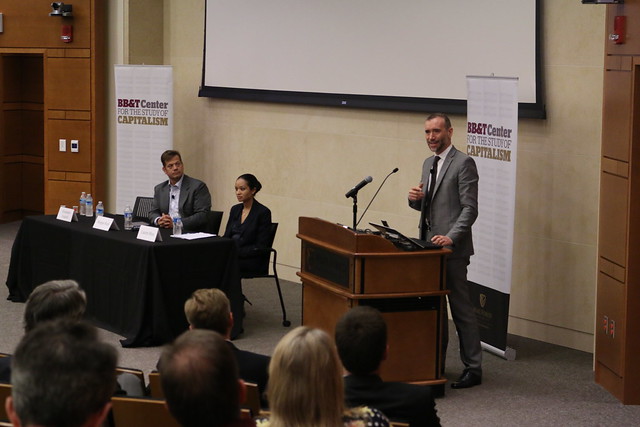Personal Concierge or Big Brother: Big data and privacy concerns

By Stephanie Skordas, Sr. Associate Director, Communications
How an organization handles data can have implications for consumers and the organization. A panel discussion on September 15 in Broyhill Auditorium examined some of these ethical dilemmas. Hosted by the BB&T Center for the Study of Capitalism, “Personal concierge or Big Brother?” attempted to explore the intersection of economics and privacy.
One of the topics discussed by panelists Morgan Reed, executive director of ACT, and Alessandro Acquisti, professor of information technology and public policy at Carnegie Mellon University was data sharing and privacy setting for apps.
“On the one hand, it’s the norm for many apps to request access to all your information in order to provide better behavioral advertising,” Reed said. “But how data is used is important. Organizations should tell people what they’re collecting and why.” He pointed out that there is a chasm between the assumptions of privacy experts and those of the average consumer. He said it’s important to use language and present the information in an easy to understand way.
Story continues below:
When it comes to facial recognition technology, Acquisti said there are some major privacy concerns. “You can change your email address and phone number easily, and even your physical address. But it’s really hard and costly to change your face.” Acquisti mentioned a study in which he was able to predict people’s social security numbers using facial recognition software and their social media profiles.
As Assistant Professor of IS and Analytics Lauren Rhue moderated the panel, the discussion ranged from data sharing at the global level to apps, privacy and law enforcement. As algorithms are written to select newsfeeds on social media profiles, or to glean insight from large data sets, the topic of bias comes up.
“A lot of decisions are being made by algorithms,” Acquisti said. “And only the authors know what they algorithms are. Do they discriminate, even without the knowledge of their creators, just by how they are written?”
View a photo gallery from the event:
